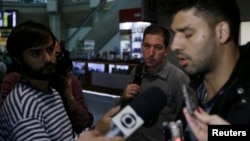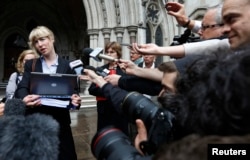LONDON —
British police said on Thursday that documents seized from the partner of a journalist, who has led coverage of Edward Snowden's leaks about U.S. and British electronic spying, were “highly sensitive” and, if disclosed, could put lives at risk.
Counter-terrorism detectives said they had begun a criminal investigation following a preliminary examination of the material taken from David Miranda, partner of American journalist Glenn Greenwald, after he was held for nine hours at London's Heathrow Airport on Sunday.
The inquiry is the latest twist in a surveillance scandal that has pitted U.S. President Barack Obama against the Kremlin and prompted British Prime Minister David Cameron's advisers to demand the return of secrets from the Guardian newspaper.
Miranda, a Brazilian citizen who had been ferrying documents between Greenwald and a Berlin-based journalist contact of Snowden's, was held at Heathrow under anti-terrorism powers, before being released without charge minus his laptop, phone, a computer hard drive and memory sticks.
“Initial examination of material seized has identified highly sensitive material, the disclosure of which could put lives at risk,” London's Metropolitan Police said in a statement.
The police refused to give any further details about the criminal inquiry, and Miranda's lawyer, Gwendolen Morgan, told reporters she knew very little about the investigation or what the basis for it was.
Earlier, Miranda's lawyers went to London's High Court to try to prevent British authorities from looking at the tens of thousands of documents on the seized devices.
However, two judges gave the authorities until Aug. 30 to sift through the documents on the proviso it was for the defense of national security and to investigate any possible links to terrorism.
“We welcome the decision of the court which allows our examination of the material - containing thousands of classified intelligence documents - to continue in order to protect life and national security,” the police statement said.
Greenwald, who is based in Brazil and writes for Britain's Guardian, has published articles based on documents leaked by Snowden, the former U.S. National Security Agency contractor who faces criminal charges in the United States.
Media freedom
British security officials say the Snowden leaks, which showed the scale of U.S. and British eavesdropping on everything from phone calls and emails to internet and social media use, have undermined national security and could put lives at risk.
But the detention of Miranda and British government pressure on the Guardian have dragged Cameron into an international row over media freedom and the powers of the security services.
Germany has criticized Britain while Russia, which has granted Snowden temporary asylum, accused the British government of double standards over press freedom.
The Brazilian government, which has complained about the “unjustified” detention of Miranda, asked Britain to return the electronic equipment seized from him.
It was unclear what documents Miranda was carrying or what secrets could have forced Britain to act in such a way. Greenwald has vowed that Britain would come to regret its actions which he said were an attempt to intimidate him.
David Anderson, a lawyer who acts as Britain's Independent Reviewer of Terrorism Legislation, wrote to Home Secretary Theresa May on Thursday to say he would investigate whether the powers under which police detained Miranda were used lawfully.
Miranda's lawyers have also started legal action to ask judges to rule that his detention was illegal and his lawyer Morgan said they might seek to appeal the High Court's decision allowing the police to continue to inspect his material.
The Guardian said on Thursday that Miranda had been involved in legitimate journalistic activity. “We ... have grave concerns that today's judgment allows police to examine without any legal oversight journalistic material seized from David Miranda,” it said in a statement on its website.
Counter-terrorism detectives said they had begun a criminal investigation following a preliminary examination of the material taken from David Miranda, partner of American journalist Glenn Greenwald, after he was held for nine hours at London's Heathrow Airport on Sunday.
The inquiry is the latest twist in a surveillance scandal that has pitted U.S. President Barack Obama against the Kremlin and prompted British Prime Minister David Cameron's advisers to demand the return of secrets from the Guardian newspaper.
Miranda, a Brazilian citizen who had been ferrying documents between Greenwald and a Berlin-based journalist contact of Snowden's, was held at Heathrow under anti-terrorism powers, before being released without charge minus his laptop, phone, a computer hard drive and memory sticks.
“Initial examination of material seized has identified highly sensitive material, the disclosure of which could put lives at risk,” London's Metropolitan Police said in a statement.
The police refused to give any further details about the criminal inquiry, and Miranda's lawyer, Gwendolen Morgan, told reporters she knew very little about the investigation or what the basis for it was.
Earlier, Miranda's lawyers went to London's High Court to try to prevent British authorities from looking at the tens of thousands of documents on the seized devices.
However, two judges gave the authorities until Aug. 30 to sift through the documents on the proviso it was for the defense of national security and to investigate any possible links to terrorism.
“We welcome the decision of the court which allows our examination of the material - containing thousands of classified intelligence documents - to continue in order to protect life and national security,” the police statement said.
Greenwald, who is based in Brazil and writes for Britain's Guardian, has published articles based on documents leaked by Snowden, the former U.S. National Security Agency contractor who faces criminal charges in the United States.
Media freedom
British security officials say the Snowden leaks, which showed the scale of U.S. and British eavesdropping on everything from phone calls and emails to internet and social media use, have undermined national security and could put lives at risk.
But the detention of Miranda and British government pressure on the Guardian have dragged Cameron into an international row over media freedom and the powers of the security services.
Germany has criticized Britain while Russia, which has granted Snowden temporary asylum, accused the British government of double standards over press freedom.
The Brazilian government, which has complained about the “unjustified” detention of Miranda, asked Britain to return the electronic equipment seized from him.
It was unclear what documents Miranda was carrying or what secrets could have forced Britain to act in such a way. Greenwald has vowed that Britain would come to regret its actions which he said were an attempt to intimidate him.
David Anderson, a lawyer who acts as Britain's Independent Reviewer of Terrorism Legislation, wrote to Home Secretary Theresa May on Thursday to say he would investigate whether the powers under which police detained Miranda were used lawfully.
Miranda's lawyers have also started legal action to ask judges to rule that his detention was illegal and his lawyer Morgan said they might seek to appeal the High Court's decision allowing the police to continue to inspect his material.
The Guardian said on Thursday that Miranda had been involved in legitimate journalistic activity. “We ... have grave concerns that today's judgment allows police to examine without any legal oversight journalistic material seized from David Miranda,” it said in a statement on its website.













